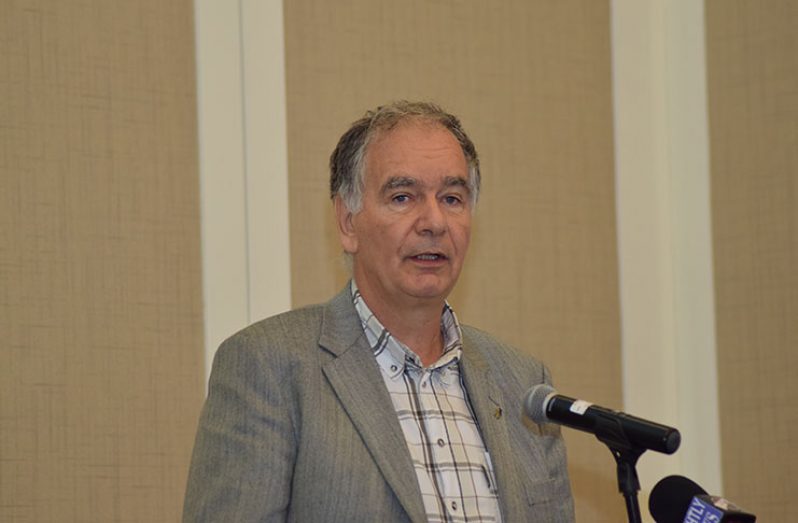WITH the Guyana government banking on diversification to push development through its agriculture sector, a European Union (EU) expert said such strategy would be successful only with fair pricing of produce on the local and international markets.Albert Losseau, Agriculture Programme Manager, Bilateral Section, Delegation of the European Union to Guyana, Suriname and for the Dutch Overseas Countries and Territories, acknowledged that major agricultural challenges are facing the development of the sector throughout the Caribbean Community (CARICOM).
In delivering an address at the CSME Private Sector and Rural Communities workshop hosted at the Marriott Hotel, Kingston, Georgetown,on Wednesday, Losseau said the EU has developed stronger ties with the region beyond the broad and complex processes of the CSME.
He expressed particular concern over Guyana’s sugar industry and suggested pricing and alternative markets for revival of the industry here. He highlighted that the challenge in the agriculture sector is not in production, but in commercialisation of goods.
Prime Minister Moses Nagamootoo while delivering a message on World Food Day at the Mahaicony Community Center ground, had expressed concern that various imported products deck the shelves of supermarkets and grocery stores when Guyana produces the same things.
However, Losseau pointed out, “Guyana’s strategy to diversify its agriculture will succeed,only if farmers are able to sell their production at a fair price not only on [the] local market, but also on the regional market. Sugar is a good example.”
With the removal of the preference price from the European market, it is essential to seek more attractive markets for Guyana’s sugar and other agricultural produce, he pointed out.
“There is currently a 40 per cent Common External Tariff (CET) within CARICOM for brown sugar ,but no protection for refined sugar. That means that producers in the region are not encouraged to invest in a refinery plant as it will not be competitive,” he explained.
Within its 10-year commitment to the CSME, the EU has pumped over $18 million EUR toward the strengthening of economic ties between governments and people of CARICOM. Losseau disclosed that the EU investment also stretches beyond the $18 million euros spent on the CSME.
“This latest programme, under the 10th European Development Fund (EDF), has a budget of 18 million EUROs that we have committed. It is a sign of our belief in the value of regional integration and also of our partnership with the Caribbean countries,” the EU representative stated.
The EDF is a fund created by EU member states to finance projects and programmes in the African Caribbean Pacific (ACP) states and the Overseas Countries and Territories (OCT). Administered by the European Commission, with the exception of risk capital, each EDF is supplemented by EIB loans. The EU has set aside billions of Euro dollars as allowances to various countries and regional integration programmes.
Losseau told the workshop that the EU’s commitment to the private sector in the Caribbean goes beyond the CSME programme, and includes a Regional Private Sector Development Programme (RPSDP) which is executed by Caribbean Export, with a budget of over $20M EURO.
The programme falls under the European Union 10th EDF CSME and Economic Integration programme, and a contribution agreement of €28.3 m was signed along with a €3 m Technical Cooperation Facility (TCF) to boost local capacity and the Regional Private Sector Development Programme (RPSDP). A Contribution Agreement of €28.3 m was also signed for the RPSDP with the Caribbean Export Development Agency (CEDA).
“We have also invested considerable funds into the agriculture sectors of the region through the Agriculture Policy Programme (APP) ($8.6 M EUR) and the Sanitary and Phytosanitary Standards Project (SPSP) ($11.6 M EUR), which are both implemented by ( Inter-American Institute for Cooperation on Agriculture (IICA) with objective to strengthen agriculture trade, investment and growth,” he explained.
The European Union has kept its promise and has supported CARICOM in the implementation of the CSME since 2006, as it said in a message to CARICOM in February 2006.
The message stated that the EU would “Strongly support the completion and operation of the CSME as an essential element of regional integration and a significant step towards the establishment of an Economic Partnership Agreement with the EU… (EU) welcomes the establishment of the new Regional Development Fund which is designed to assist disadvantaged CARICOM countries in respect of the operation and functioning of the Single Market.”
With the EU itself commencing its operations as a single market and economy and understanding the benefits of such a unit, he encouraged stakeholders to participate and fully understand what the CSME means for CARICOM’s people and rural communities.
“[TheEU] started with the European Coal and Steel Community in 1950 [and] transformed in 1957 to the EEC, the Common Market, by the Rome treaty and had several enlargements and adaptions to reach the 28 [or 27] European Union you know.”
The CSME workshop is aimed at providing guidance and information to businesses in utilising the CSME to increase productivity and to their competitive advantage, providing an update on the status of the CSME implementation as well.
Fair pricing vital — to push Guyana’s agriculture diversification agenda, says EU expert
SHARE THIS ARTICLE :
Facebook
Twitter
WhatsApp




.jpg)










